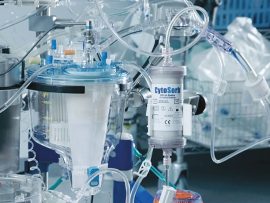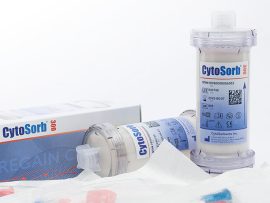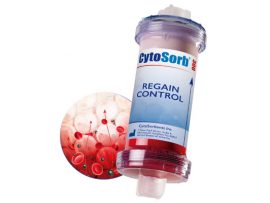Abstract Background Open cardiac surgery involving cardiopulmonary bypass (CPB) triggers a systemic inflammatory response that significantly affects clinical outcomes. However, the dynamics and specific roles of cytokine release after CPB..
Read MoreAbstract Allogeneic red blood cells (RBCs) are commonly used for cardiopulmonary bypass (CPB) circuit priming in congenital heart surgery. While convection-based pre-bypass ultrafiltration (PBUF) corrects acid–base, electrolyte, and metabolite imbalances,..
Read MoreAbstract Cytokine hemoadsorption therapy has been proposed to reduce inflammation in patients with hyperinflammation. However, the clinical benefit of cytokine hemoadsorption therapy during venovenous extracorporeal membrane oxygenation (VV ECMO) is..
Read MoreAbstract Background: Sepsis and septic shock are major contributors to global morbidity and mortality. The “cytokine storm,” a hyper-inflammatory response, plays a central role in sepsis pathophysiology, leading to multi-organ..
Read MoreAbstract Background: Cardiopulmonary bypass (CPB) and extracorporeal membrane oxygenation (ECMO) are widely used. Previous methods to reduce inflammation have shown inconsistent results. We developed a cytokine adsorption column using polymethyl methacrylate..
Read MoreAbstract Cytokine storm (CS) is a severe systemic inflammatory syndrome characterized by the excessive activation of immune cells and a significant increase in circulating levels of cytokines. This pathological process..
Read MoreAbstract Background: Cardiac surgery can lead to dysregulation with a pro-inflammatory state, resulting in adverse outcomes. Hemadsorption using the AN69 membrane (Oxiris membrane) has the properties to chelate inflammatory cytokines...
Read MoreAbstract Background Cardiopulmonary bypass (CPB) triggers marked cytokine release often followed by a systemic inflammatory response syndrome, associated with adverse postoperative outcomes. This trial investigates the intraoperative use of haemoadsorption..
Read MoreThis case reports on a 41-years old male with no significant medical history who was admitted to the emergency room following 25% total body surface area (TBSA) deep partial thickness..
Read MoreAbstract Introduction Cytokine adsorption using the CytoSorb® adsorber has been proposed in various clinical settings including sepsis, ARDS, hyperinflammatory syndromes, cardiac surgery or recovery after cardiac arrest. The aim of..
Read MoreAbstract Elevated levels of neutrophil extracellular traps (NETs) have been reported in primary graft dysfunction, making methods to reduce or remove them highly valuable. The mechanisms behind primary graft dysfunction..
Read MoreAbstract Objectives Ischemia–reperfusion injury often coincides with a , which can result in following . Our previous research has demonstrated improvement by cytokine adsorption during ex vivo lung perfusion. The aim of this study was..
Read MoreAbstract Introduction: Immunomodulatory therapies have shown beneficial effects in patients with severe COVID-19. Patients with hypercytokinemia might benefit from the removal of inflammatory mediators via hemadsorption. Methods: Single-center prospective randomized trial at..
Read MoreAbstract El síndrome de dificultad respiratoria del adulto (SDRA) por el virus SARS-CoV-2 tiene una alta morbi-mortalidad secundaria al severo compromiso pulmonar sumado a una respuesta inmune disregulada, causal de..
Read MoreAbstract Novel Coronavirus Disease in most cases produces mild symptoms which resolve after a few days. Some authors hypothesized that SARS-CoV-2 infection could trigger excessive cytokine production leading to a..
Read MoreAbstract In recent years, extracorporeal hemadsorption (HA) techniques capable of adsorbing pro- and anti-inflammatory cytokines are increasingly used in various clinical situations. The therapeutic benefit of cytokine elimination likely depends..
Read MoreAbstract Respiratory failure and systemic inflammation are paramount features of severe SARS-CoV-2 disease (COVID-19). Extracorporeal membrane oxygenation (ECMO) therapy has a potential role in patients with refractory disease. An inflammatory..
Read MoreDear Editor, Septic shock and the underlying dysregulated inflammatory host-response remain major contributors to mortality in critically ill patients. In contrast to classic hemofiltration strategies, cytokine adsorption through bulk removal..
Read MoreAbstract Both antiviral treatment with remdesivir and hemoadsorption using a CytoSorb® adsorption device are applied in the treatment of severe COVID‐19. The CytoSorb® adsorber consists of porous polymer beads that adsorb a..
Read MoreAbstract Introduction Patients subject to major surgery, suffering sepsis, major trauma, or following cardiopulmonary bypass exhibit a systemic inflammatory response. This inflammatory response involves a complex array of inflammatory polypeptide..
Read MoreAbstract Objectives Compare the effects on inflammatory (TNF-α, IL-6, IL-8 and IL-10) and immunologic (CD3+, CD4+, CD8+, CD11b+, CD16+/56+ T cells and total lymphocyte concentration) variables of hydroxyethyl starch 130/0.4, 4%..
Read MoreDespite the critical role of cytokines in the modulation of the immune response, cytokine hyperactivity has been implicated in the pathogenesis of severe organ failure secondary to sepsis, cardiac surgery,..
Read MoreAbstract Introducton: Infective endocarditis is a serious disease condition. Depending on the causative microorganism and clinical symptoms, cardiac surgery and valve replacement may be needed, posing additional risks to patients..
Read MoreAbstract The use of cardiopulmonary bypass (CPB) in cardiothoracic surgery results in a well-known activation of the immunologic response. In some cases, however, this triggered immunologic response may be excessive,..
Read More













